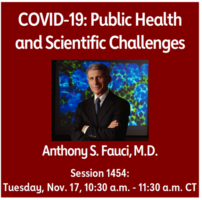
“We’ve not seen anything like this since the pandemic of 1918,” said Dr. Anthony Fauci, Director of the National Institute of Allergy and Infections Diseases.
Fauci spoke to attendees of the American Heart Association’s 2020 Scientific Sessions. His presentation, “COVID-19: Public Health & Scientific Challenges”, addressed many of the struggles found in the realm of cardiovascular diseases due to the coronavirus.
To date, COVID-19 is the 3rd pandemic coronavirus the world has faced and has, to date, reached up to 50 million cases and 1.2 million deaths worldwide. In the United States, there has been 10 million cases and over 230,000 deaths to date and on November 4, 2020, saw 100,000 cases reported – the highest one-day total.
Fauci noted that the virus is transmitted through exposure to respiratory droplets (found in distances of six feet or less) and noted that it is also found in other bodily fluids.
He then went on to describe the fundamentals in preventing it, noting five specific ways to do so:
– Universal wearing of masks
– Physical distance of at least 6 feet
– Avoid crowds and congregate settings
– Conduct activities outdoors
– Frequent washing of hands
Fauci also noted that if these five fundamentals were adhered to nationally, we would not have the current surging of cases we are now seeing.
Fauci pointed out that older adults and people of any age with underlying medical conditions are most susceptible. Underlying conditions such as chronic heart conditions, hypertension, smoking, type 2 diabetes and obesity are found to be very problematic for patients.
COVID can cause severe cardiovascular issues even for those who overcome it, according to Fauci. Post-COVID-19 syndrome impacts people with lingering symptoms, including “brain fog” (inability to concentrate) and heart damage, fatigue, shortness of breath, and muscle aches.
Fauci discussed a German study that showed that of people who recovered from the virus, 78% of patients (through MRI scans) had cardiac involvement and 60% had ongoing myocardial inflammation, which could lead to chronic effects. Another study showed that of college athletes who were infected with the virus and underwent cardiac MRI, 15% had findings consistent with myocarditis.
Racial and ethnic disparities were especially focused on by Fauci. He noted that the nation is seeing a profound disparity not only in incidence of infection (jobs that put them out in the community), but also an increase in the comorbidities for Hispanic Americans, African Americans and Native Americans. Fauci presented a graph that showed that when looking at hospitalization rates (per 100,000 population), 408 were Hispanic/Latino, 399 were Native American/Alaskan Native and 390 were African American, compared to 94 for whites.
Fauci did present some encouraging news. The National Institutes of Health have created an expert COVID-19 treatment guidelines panel. This panel has a “living document” that is constantly being updated with new clinical data, allowing for rapid information availability for physicians across the nation. This document can be found at www.Covid19treatmentguidelines.nih.gov .
Fauci also spoke to the recent information on potential COVID-19 vaccines. There are three main platforms for the vaccines – nucleic acid (which is the Pfizer and Moderna vaccines), viral vector and protein subunit. There are currently six ongoing vaccines and three are officially in phase 3 trial. Fauci noted that the Pfizer vaccine had more than 90% efficacy and that Moderna is close behind with their vaccine trials.
Fauci concluded his presentation with, as he called it, “cautious optimism”, sharing that, for many, the belief is that by the end of this year into early 2021 the nation will be administering vaccine doses, first to the highest priority cases and then to the rest of the nation.
For more information, Fauci encouraged people to visit the COVID-19 Prevention Network at www.preventcovid.org.